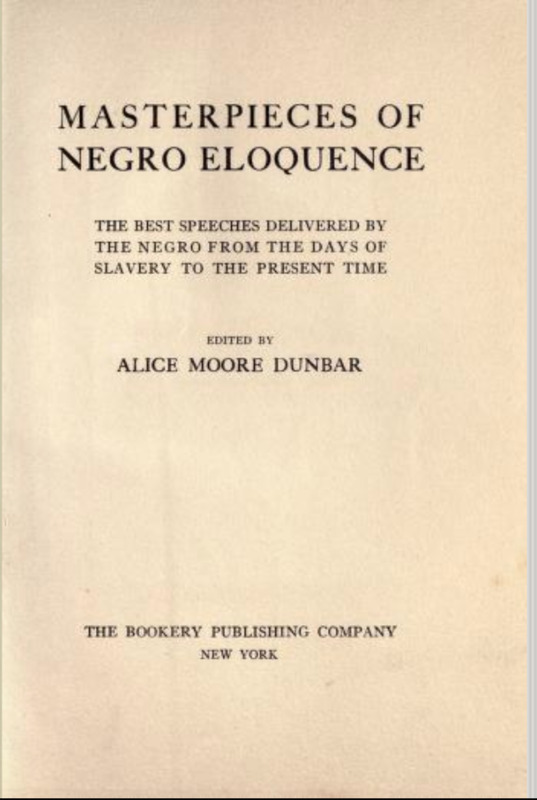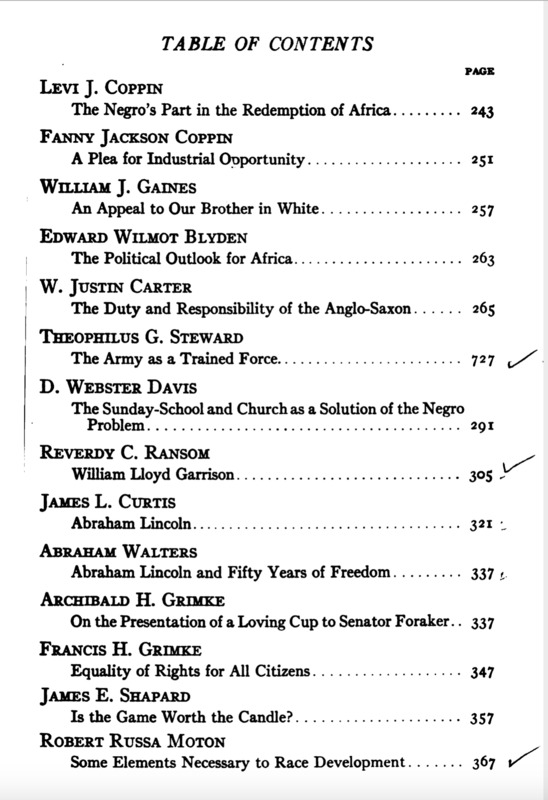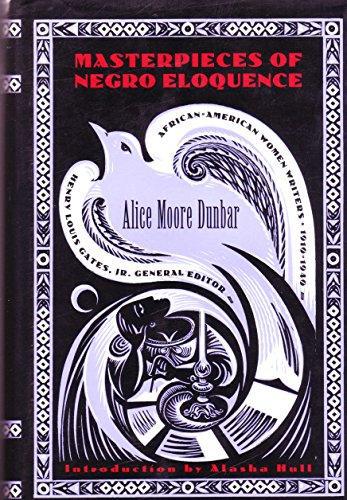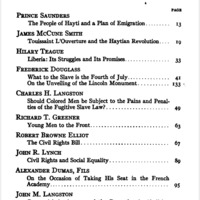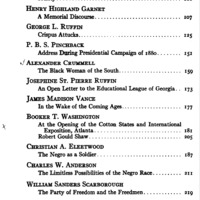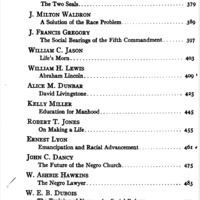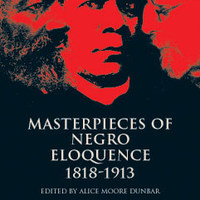-
Title
-
Masterpieces of Negro Eloquence: The Best Speeches Delivered by the Negro from the Days of Slavery to the Present Time
-
This edition
-
"Masterpieces of Negro Eloquence: The Best Speeches Delivered by the Negro from the Days of Slavery to the Present Time" . Ed. Alice Moore Dunbar [= Alice Dunbar-Nelson]. New York: Bookery, 1914. 512 pp.
-
Other editions, reprints, and translations
-
• New York: Johnson Reprint Corp., 1970. 512 pp. (The Basic Afro-American Reprint Library.)
• Intro. Akasha Hull. New York: G. K. Hall, 1997. xxix+512 pp. (African-American Women Writers, 1910-1940.)
• Repr. as "Masterpieces of Negro Eloquence, 1818-1913". Ed. Alice Moore Dunbar. Intro. Manning Marable. Mineola, NY: Dover, 2000. xiv+369 pp.
-
Online access
-
• Internet Archive (1919 ed.): U of California copy
-
Internet Archive
-
• Hathi Trust (1919 ed.): U of California copy [missing first page of preface] and U of Virginia copy
-
Hathi Trust
-
• Google Books (1919 ed.): U of Virginia copy
-
Google Books
-
• HathiTrust (1970 Johnson repr.): U of Michigan copy and Pennsylvania State U copy
-
HathiTrust
-
Table of contents
-
Contents (1914 ed.): [misprints in the table of contents have been corrected in what is given below]
[Alice Moore Dunbar / Preface (unpaginated, 2 pp.)]
• Prince Saunders / The People of Hayti and a Plan of Emigration [extracts] (13-18)
• James McCune Smith / Toussaint L'Ouverture and the Haytian Revolution (19-32)
• Hilary Teague / Liberia: Its Struggles and Its Promise (33-40)
• Frederick Douglass / What to the Slave is the Fourth of July (41-48)
• Charles H. Langston / Should Colored Men Be Subject to the Pains and Penalties of the Fugitive Slave Law? (49-62)
• Richard T. Greener / Young Men to the Front (63-66)
• Robert Browne Elliot / The Civil Rights Bill (67-88)
• John R. Lynch / Civil Rights and Social Equality (89-94)
• Alexander Dumas, Fils / On the Occasion of Taking His Seat in the French Academy (95-96)
• John M. Langston / Centennial Anniversary of the Pennsylvania Abolition Society (97-100)
• Frances Ellen Watkins Harper / Centennial Anniversary of the Pennsylvania Abolition Society (101-06)
• Henry Highland Garnet / A Memorial Discourse (107-24)
• George L. Ruffin / Crispus Attucks (125-32)
• Frederick Douglass / Oration on the Unveiling of the Lincoln Monument (133-50)
• P. B. S. Pinchback / Address during Presidential Campaign of 1880 (151-58)
• Alexander Crummell / The Black Woman of the South (159-72)
• Josephine St. Pierre Ruffin / An Open Letter to the Educational League of Georgia (173-76)
• James Madison Vance / In the Wake of the Coming Ages (177-80)
• Booker T. Washington / At the Opening of the Cotton States and International Exposition, Atlanta (181-86)
• Christian A. Fleetwood / The Negro as a Soldier (187-204)
• Booker T. Washington / Robert Gould Shaw (205-10)
• Charles W. Anderson / The Limitless Possibilities of the Negro Race (211-18)
• William Sanders Scarborough / The Party of Freedom and the Freedmen (219-26)
• Nathan F. Mossell / The Teaching of History (227-32)
• George H. White / A Defense of the Negro Race (233-42)
• Levi J. Coppin / The Negro's Part in the Redemption of Africa (243-50)
• Fanny Jackson Coppin / A Plea for Industrial Opportunity (251-56)
• William J. Gaines / An Appeal to Our Brother in White (257-62)
• Edward Wilmot Blyden / The Political Outlook for Africa (263-64)
• W. Justin Carter / The Duty and Responsibility of the Anglo-Saxon Idea of Citizenship (265-76)
• Theophilus G. Steward / The Army as a Trained Force (277-90)
• D. Webster Davis / The Sunday-School and Church as a Solution of the Negro Problem (291-304)
• Reverdy C. Ransom / William Lloyd Garrison (305-20)
• James L. Curtis / Abraham Lincoln (321-24)
• Abraham Walters / Abraham Lincoln and Fifty Years of Freedom (325-36)
• Archibald H. Grimké / On the Presentation of a Loving Cup to Senator Foraker (337-46)
• Francis H. [sic] Grimké / Equality of Rights for All Citizens (347-56)
• James E. Shapard / Is the Game Worth the Candle? (357-66)
• Robert Russa Moton / Some Elements Necessary to Race Development (367-78)
• George William Cook / The Two Seals (379-88)
• J. Milton Waldron / A Solution of the Race Problem (389-96)
• J. Francis Gregory / The Social Bearings of the Fifth Commandment (397-402)
• William C. Jason / Life's Morn (403-08)
• William H. Lewes / Abraham Lincoln (409-24)
• Alice M. Dunbar / David Livingstone (425-44)
• Kelly Miller / Education for Manhood (445-54)
• Robert T. Jones / On Making a Life (455-60)
• Ernest Lyon / Emancipation and Racial Advancement (461-74)
• John C. Dancy / The Future of the Negro Church (475-82)
• W. Ashbie Hawkins / The Negro Lawyer (483-90)
• W. E. B. Du Bois / The Training of Negroes for Social Reform (491-504)
[Index (505-12)]
Contents (2000 Dover ed.): People of Hayti and a Plan of Emigration / Prince Saunders 1 -- Toussaint L'Ouverture and the Haytian Revolutions / James McCune Smith 5 -- Liberia: Its Struggles and Its Promises / Hilary Teague 15 -- What to the Slave Is the Fourth of July? / Frederick Douglass 21 -- Should Colored Men Be Subject to the Pains and Penalties of the Fugitive Law? / Charles H. Langston 27 -- Young Men, to the Front! / Richard T. Greener 37 -- Civil Rights Bill / Robert Brown Elliott 40 -- Civil Rights and Social Equality / John R. Lynch 55 -- Tribute to His Father, Alexandre Dumas, Pere / Alexandre Dumas, Fils 60 -- Centennial Anniversary of the Pennsylvania Abolition Society / John Mercer Langston 61 -- Centennial Anniversary of the Pennsylvania Abolition Society / Frances Ellen Watkins Harper 64 -- A Memorial Discourse / Henry Highland Garnet 69 -- Crispus Attucks / George L. Ruffin 82 -- Oration on the Occasion of the Unveiling of the Freedmen's Monument / Frederick Douglass 88 -- Address during the Presidential Campaign of 1880 / Pinkney Benton Stewart Pinchback 101 -- Black Woman of the South / Alexander Crummell 107 -- An Open Letter to the Educational League of Georgia / Josephine St. Pierre Ruffin 117 -- In the Wake of the Coming Ages / James Madison Vance 120 -- At the Opening of the Cotton States and International Exposition, Atlanta / Booker T. Washington 123 -- Negro as a Soldier / Christian A. Fleetwood 128 -- Robert Gould Shaw / Booker T. Washington 141 -- Limitless Possibilities of the Negro Race / Charles W. Anderson 145 -- Party of Freedom and the Freedmen / William Sanders Scarborough 151 -- Teachings of History / Nathan F. Mossell 157 -- A Defense of the Negro Race / George H. White 162 -- Negro's Part in the Redemption of Africa / Levi J. Coppin 169 -- A Plea for Industrial Opportunity / Fanny Jackson Coppin 175 -- An Appeal to Our Brother in White / William J. Gaines 179 -- Political Outlook for Africa / Edward Wilmot Blyden 183 -- Duty and Responsibility of the Anglo-Saxon Idea of Citizenship / W. Justin Carter 185 -- Army as a Trained Force / Theophilus G. Steward 194 -- Sunday-School and Church as a Solution of the Negro Problem / D. Webster Davis 204 -- William Lloyd Garrison / Reverdy C. Ransom 215 -- Abraham Lincoln / James L. Curtis 227 -- Abraham Lincoln and Fifty Years of Freedom / Alexander Walters 230 -- On the Presentation of a Loving Cup to Senator Foraker / Archibald H. Grimke 238 -- Equality of Rights for All Citizens / Francis J. Grimke 245 -- Is the Game Worth the Candle? / James E. Shepard 252 -- Some Elements Necessary to Race Development / Robert Russa Moton 260 -- Two Seals / George William Cook 269 -- A Solution of the Race Problem / J. Milton Waldron 276 -- Social Bearings of the Fifth Commandment / James Francis Gregory 282 -- Life's Morn / William C. Jason 287 -- Abraham Lincoln / William H. Lewis 292 -- David Livingstone / Alice Moore Dunbar 304 -- Education for Manhood / Kelly Miller 318 -- On Making a Life / Robert E. Jones 325 -- Emancipation and Racial Advancement / Ernest Lyon 329 -- Future of the Negro Church / John C. Dancy 339 -- Negro Lawyer / W. Ashbie Hawkins 345 -- Training of Negroes for Social Reform / W.E.B. Du Bois 351.
-
About the anthology
-
• Each selection is preceded by a brief biographical headnote about the author.
• The occasion of each speech, lecture, or oration is given in a footnote at the start of each item (and an indication whether the piece is complete or an extract)--but the source of the text is not specified. (In the preface, Alice Dunbar credits the collections and officers of the Negro Society for Historical Research as well as living contributors and the relatives of those who are deceased for assistance with gaining access to materials.)
• In the preface, Alice Dunbar indicates that this is neither a comprehensive collection ("a complete anthology"), nor a definitive collection (an anthology of all the best works), but, instead, an introductory collection (a "guide-post," giving some of the best material and "pointing the way to a fuller work").
• The volume includes a relatively detailed index (505-12), which shows the prominence of certain topics or themes in the selections: e.g., Africa, the slave trade, abolitionists, William Lloyd Garrison, the civil war, emancipation/the Emancipation Proclamation, Abraham Lincoln, the United States/the Republic, the American Revolution, the Declaration of Independence, the Constitution, Moses.
-
Anthology editor(s)' discourse
-
From the preface, dated October, 1913:
• "It seems eminently fitting and proper in this year, the fiftieth anniversary of the Proclamation of Emancipation that the Negro should give pause and look around him at the things which he has done, those which he might have done, and those which he intends to do. . . . In considering the literary work of the Negro, his preeminence in the field of oratory is striking. Since the early nineteenth century until the present time, he is found giving eloquent voice to the story of his wrongs and his proscriptions. . . . Therefore, it seems appropriate in putting forth a volume commemorating the birth of the Negro into manhood, to collect some of the speeches he made to help him win his manhood, his place in the economy of the nation, his right to stand with his face to the sun" (preface, unpaginated).
• "The present volume does not aim to be a complete collection of Negro Eloquence; it does not even aim to present the best that the Negro has done on the platform, it merely aims to present to the public some few of the best speeches made within the past hundred years. Much of the best is lost; much of it is hidden away in forgotten places. We have not always appreciated our own work sufficiently to preserve it, and thus much valuable material is wasted. Sometimes it has been difficult to obtain good speeches from those who are living because of their innate modesty, either in not desiring to appear in print, or in having thought so little of their efforts as to have lost them" (preface, unpaginated).
• "The Editor is conscious that many names not in the table of contents will suggest themselves to the most casual reader, but the omissions are not intentional nor yet of ignorance always, but due to the difficulty of procuring the matter in time for the publication of the volume be[f]ore the golden year shall have closed" (preface, unpaginated).
• "I cannot adequately express my gratitude to Mr. John E. Bruce and Mr. Arthur A. Schomburg, President and Secretary of the Negro Society for Historical Research, for advice, suggestion, and best of all, for help in lending priceless books and manuscripts and for aid in copying therefrom" (preface, unpaginated).
• "Again, we repeat, this volume is not a complete anthology; not the final word in Negro eloquence of to-day, nor yet a collection of all the best; it is merely a suggestion, a guide-post, pointing the way to a fuller work, a slight memorial of the birth-year of the race" (preface, unpaginated).
-
• Dedication: "To the boys and girls of the Negro race, this book is dedicated, with the hope that it may help inspire them with a belief in their own possibilities."
-
Reviews and notices of anthology
-
• n/a
-
See also
-
• Adams, Katherine, Sandra A. Zagarell, and Caroline Gebhard. "Alice Dunbar-Nelson's Published Works: A Bibliography in Progress." "Legacy: A Journal of American Women Writers" 33.2 (2016): 254-58. Project Muse
-
Cited in
-
• Lash 1946: 723.
• [not in Kinnamon 1997]
-
Item Number
-
A0009
